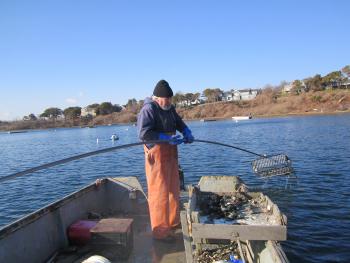Mike Anderson

Cape Cod Shellfish Industry Interviews
This is a collection of 15 interviews conducted in 2007 with people on Cape Cod who are involved in the shellfishing industry. Five people who are employed by towns to manage and regulate shellfish (Shellfish Officers), seven people who own shellfish aquaculture businesses (Growers), and four people who harvest wild shellfish commercially (Commercial Harvesters) were asked the question “What does shellfishing mean to you?”. From that starting point, questions centered on how the individual got into shellfishing and then what they thought the future of shellfishing might be.
The interviews were conducted by Sandy Macfarlane, a retired shellfish biologist and conservation administrator for the town of Orleans. The work was done under a contract with the Barnstable County Cooperative Extension Marine Program. Each interview is summarized into a written document that varies from 807 to 1557 words long and has an accompanying photograph. The interviews represent geographic, age, gender, and experience diversity as well as shellfish species diversity. All interviewees are year round residents of Cape Cod. One theme that emerged from this work is that shellfishing remains an important component of the Cape Cod economy and culture and those who are involved are concerned about its continued presence.
In 2007, Mike was a seasoned commercial shellfish harvester in Chatham. Born into a family with a rich maritime heritage, Anderson developed an affinity for the ocean at a young age. He honed his skills in shellfishing through years of hands-on experience, navigating the intricate waterways and understanding the rhythms of the tides that influence the shellfish populations. Over the decades, Anderson has become a respected figure within the local shellfishing community, known for his expertise in harvesting clams, oysters, and other shellfish species that thrive in the Cape's unique marine ecosystem. His work is not just a means of livelihood but also a testament to the traditional practices that have sustained coastal communities for generations. Anderson's dedication to his craft is matched by his commitment to preserving the health and sustainability of shellfish stocks, ensuring that future generations can continue to benefit from this natural resource.
Scope and Content Note
The interview with Mike Anderson provides a comprehensive overview of his experiences and insights as a commercial shellfisherman in Chatham, Cape Cod. He discusses the freedom and independence that comes with shellfishing, how he moved to Cape Cod and discovered shellfishing, the fisheries he was involved in at first scalloping, bullraking for quahaugs, and longlining for finfish, and the difference between Chatham and some of the other Cape towns in terms of attitude towards fishing. He lists the names of other individuals who would go bullraking and describes the fishing and drinking scene on the water and at the Land Ho, a local bar. He tells how he learned to bullrake by swapping skills with another fisherman, the places he would go bullraking, different bullrake designs, and work done with a hydraulic dredge in Pleasant Bay that affected the stock of quahaugs. He also discusses the change he witnessed in Chatham as it became "a haven for the rich." He discusses how fishing became more about money than adventure and how technology changed the fisheries. He discusses working with the Cape Cod Commercial Hook Fishermen's Association to do educational talks at the Chatham fish pier. He offers his opinions on how society has gotten out of touch with its hunter-gatherer roots. He discusses how it's harder to make a living from shellfishing now than it used to be and that few people go bullraking anymore.
Please Note: The oral histories in this collection are protected by copyright and have been created for educational, research and personal use as described by the Fair Use Doctrine in the U.S. Copyright law. Please reach out Voices@noaa.gov to let us know how these interviews are being used in your research, project, exhibit, etc. The Voices staff can help provide other useful resources related to your inquiry.
The NOAA mission is to understand and predict changes in climate, weather, oceans, and coasts, to share that knowledge and information with others, and to conserve and manage coastal and marine ecosystems and resources. The Voices Oral History Archives offers public access to a wide range of accounts, including historical materials that are products of their particular times, and may contain offensive language or negative stereotypes.
Voices Oral History Archives does not verify the accuracy of materials submitted to us. The opinions expressed in the interviews are those of the interviewee only. The interviews here have been made available to the public only after the interviewer has confirmed that they have obtained consent.
